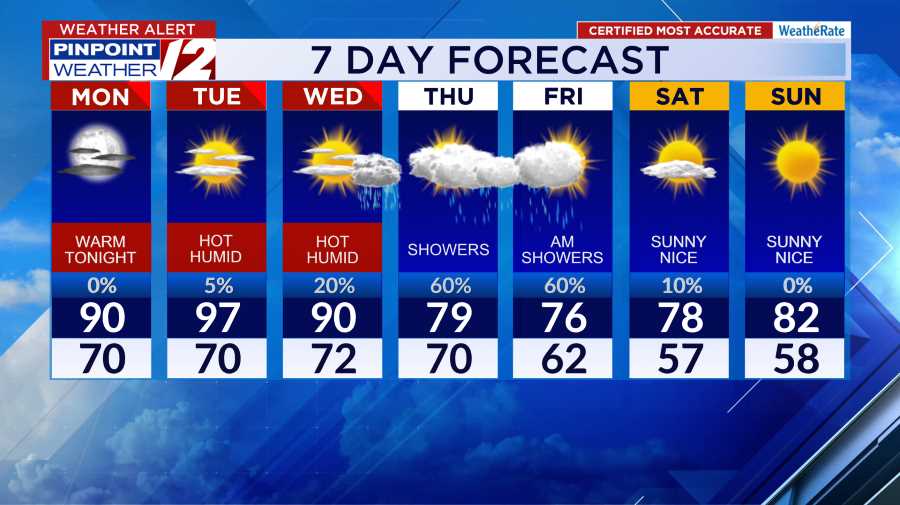PROVIDENCE, R.I. (WPRI) — Mercedes Patience learned last year her landlord was planning to sell her apartment building, meaning in all likelihood she’d need to find a new place to live.
Since then, the Rhode Island mother of six said she’s been looking but has had no luck securing a new home.
“I have been looking for a new place for almost a year and a half now,” Patience told Target 12 during a recent interview, saying the asking price at most places of $2,000 per month is beyond her budget.
Patience is one of more than 8,000 Rhode Islanders who rely on Section 8 housing vouchers to help pay for rent. The federal program helps pay a portion of rent for people who are struggling to make ends meet, a system that’s supposed to help drive down homelessness among low-income families.
But the ongoing housing crisis and soaring rents across Rhode Island has made it increasingly difficult for Patience and thousands of other low-income families to secure affordable housing. The dynamic is concerning to housing and homelessness advocates.
“There is going to be a lot of people homeless, there are a lot of people who have Section 8,” said Latoya Walmsley, a friend of Patience, who received Section 8 housing for years before she secured a full-time job working with the state. She’s since become a housing advocate.
The housing issue for low-income families is multifaceted, but at the core is a limited amount of affordable housing units throughout the state. The R.I. Commerce Corp. estimates the vacancy rate across all apartments is below 3% right now, meaning they aren't available for long.
And because the cost of rent is increasing so quickly amid soaring inflation -- which has reached a 40-year high -- Walmsley said the calculation behind how much the voucher should cover isn't keeping up. The widening gap is leaving many, including Patience, hanging in the balance.
"The landlords want more rent and Section 8 doesn’t want to raise the rent,” Walmsley said.
The U.S. Department of Housing and Urban Development oversees the Section 8 voucher program. Those who are low-income, elderly or disabled may qualify for the housing assistance program, if their income does not exceed 50% of the area median income.
For those who qualify, the voucher covers 70% to 80% of someone’s monthly housing rental fees based on an estimate of the fair market rent in that area. The other 20% to 30% is covered by the voucher recipient.
In real terms, a Providence family of seven making $29,000 would pay $725 for a four-bedroom apartment costing $2,000.
According to R.I. Housing, one of the state's housing authorities that facilitate the Section 8 program on behalf of the federal government, the vouchers are calculated based on 120% of an area's fair market rent. That's the highest rate R.I. Housing is allowed to give out under federal rules. But it also means fewer vouchers can be given out because there's only a limited amount of federal dollars available in the program.
“What we could do is lower our payment standard and issue more vouchers, but then it makes it more difficult for people to find units that they can afford,” said Michael DiChiaro, director of leased housing and rental services at R.I. Housing.
Meanwhile, tens of thousands of Rhode Islanders are on a waiting list to participate in the program, underscoring the need for assistance among low-income families. According to R.I. Housing officials, more than 25,000 people are currently waiting for a housing voucher, although DiChiaro said a lot of people who have secured the voucher are finding them useless because they can't find housing.
"We also issue vouchers to folks who have to turn them in because they can't find a unit," he said.
The average wait time for the program was two-and-a-half years in 2021, putting Rhode Island 30th in the nation for wait times, according to federal data. All New England states, where new housing development is scant, ranked in the bottom half of the country with the exception of Vermont.
Massachusetts ranked second to last.
To try and solve for pieces of the affordable housing crisis, state lawmakers this year passed a budget including $250 million for housing programs. Gov. Dan McKee signed the budget into law this week, and state housing czar Josh Saal said Commerce is spearheading a plan to build more affordable housing.
“If we don’t have physical units, no matter if you are low income, or medium income or a school teacher or a senior on a fixed income, you are going to have trouble finding housing,” Saal explained,
The boost in state funding has earned praise from advocates across the state, although some have raised concerns about whether it's enough. And even Saal acknowledged that a lot of the new housing will take years to create.
Walmsley said that's time many Rhode Islanders don’t have. And she's concerned about her friend Patience.
“In 90 days, if she doesn't find anything, where is she going to go with her kids?" Walmsley said. "It's sad to think that she may have nowhere to go."
Sarah Guernelli (sguernelli@wpri.com) is the consumer investigative reporter for 12 News. Connect with her on Twitter and on Facebook.
Eli Sherman contributed to this report.




















